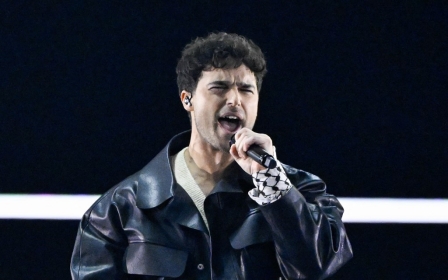Eurovision 2024: Thousands protest in Malmo against Israel's participation in final

Thousands of anti-war activists protested against Israel's inclusion in the Eurovision Song Contest on Saturday, as Israel's war on Gaza continues to cast a shadow over the final of the glitzy contest.
Large crowds of protesters, estimated between 6,000-8,000, gathered at the central square of the Swedish host city of Malmo before marching towards the contest venue, waving Palestinian flags and shouting "Eurovision united by genocide" – a twist on the contest's official slogan "united by music."
Several protesters could also be heard chanting "Shame on you" at attendees arriving at the arena, as they demanded a boycott of this year's competition for its inclusion of Israel.
Climate activist Geta Thunberg had joined the protest march, but was removed by Swedish police outside the arena where the final is taking place.
The activist was pictured wearing a Keffiyeh scarf while being escorted away from the protest moments before the final kicked off.
Stay informed with MEE's newsletters
Sign up to get the latest alerts, insights and analysis, starting with Turkey Unpacked
For weeks, anti-war activists had complained of double standards as the European Broadcasting Union (EBU), which organises the contest, banned Russia from Eurovision in 2022 following its invasion of Ukraine.
Eurovision organisers, who have always billed the annual event as non-political, resisted calls to exclude Israel over the devastating war on Gaza, and in March, the EBU confirmed that Israel's contestant Eden Golan would take part.
Golan's initial song, "October Rain", had been rejected by Eurovision organisers who took issue with the apparent reference to the 7 October Hamas-led attack on southern Israel.
On Wednesday, Golan's rehearsal performance of the rebranded song "Hurricane" was met with audible boos from live audiences in Malmo, and shouts of "Free Palestine".
Following that performance, Israeli Prime Minister Benjamin Netanyahu said Golan had "already won" and claimed the protests were part of a "horrible wave of anti-Semitism."
In the first semi-final on Tuesday, the European Broadcasting Union (EBU) rebuked Swedish-Palestinian pop singer Eric Saade for compromising “the non-political nature of the event” by wearing a Palestinian keffiyeh around his wrist.
Ireland's act, Bambie Thug, said they also were forced to remove pro-Palestine symbols from their performance.
The artist had written "Ceasefire" and "Freedom for Palestine" in ancient Celtic script as part of their costume but was ordered to change it by the EBU.
Earlier on Saturday, the contest was also rattled earlier by the disqualification of Dutch contestant Joost Klein.
According to Dutch broadcaster AVROTROS, Klein repeatedly indicated he did not want to be filmed after Thursday's performance made a “threatening movement” towards a backstage camera, but did not touch the camerawoman.
Klein had already courted controversy at Thursday’s news conference when he repeatedly covered his face with a Dutch flag, seemingly signifying he did not agree with being placed next to Israel’s contestant, Golan.
Middle East Eye delivers independent and unrivalled coverage and analysis of the Middle East, North Africa and beyond. To learn more about republishing this content and the associated fees, please fill out this form. More about MEE can be found here.




